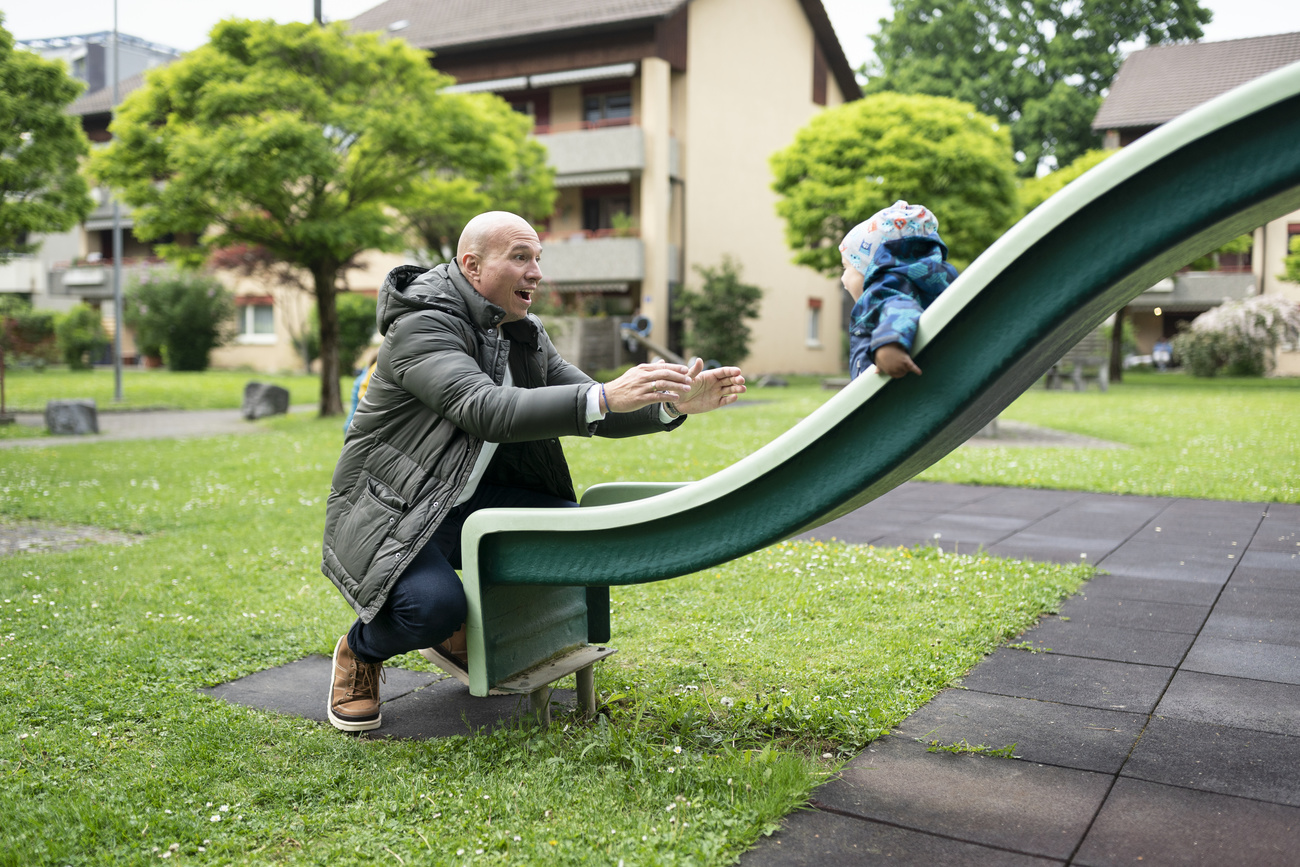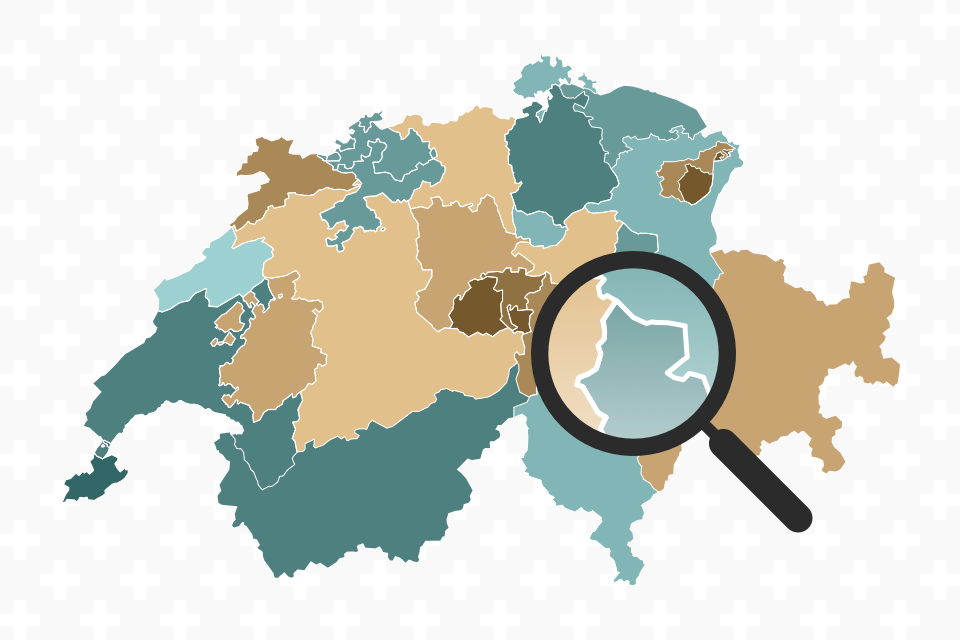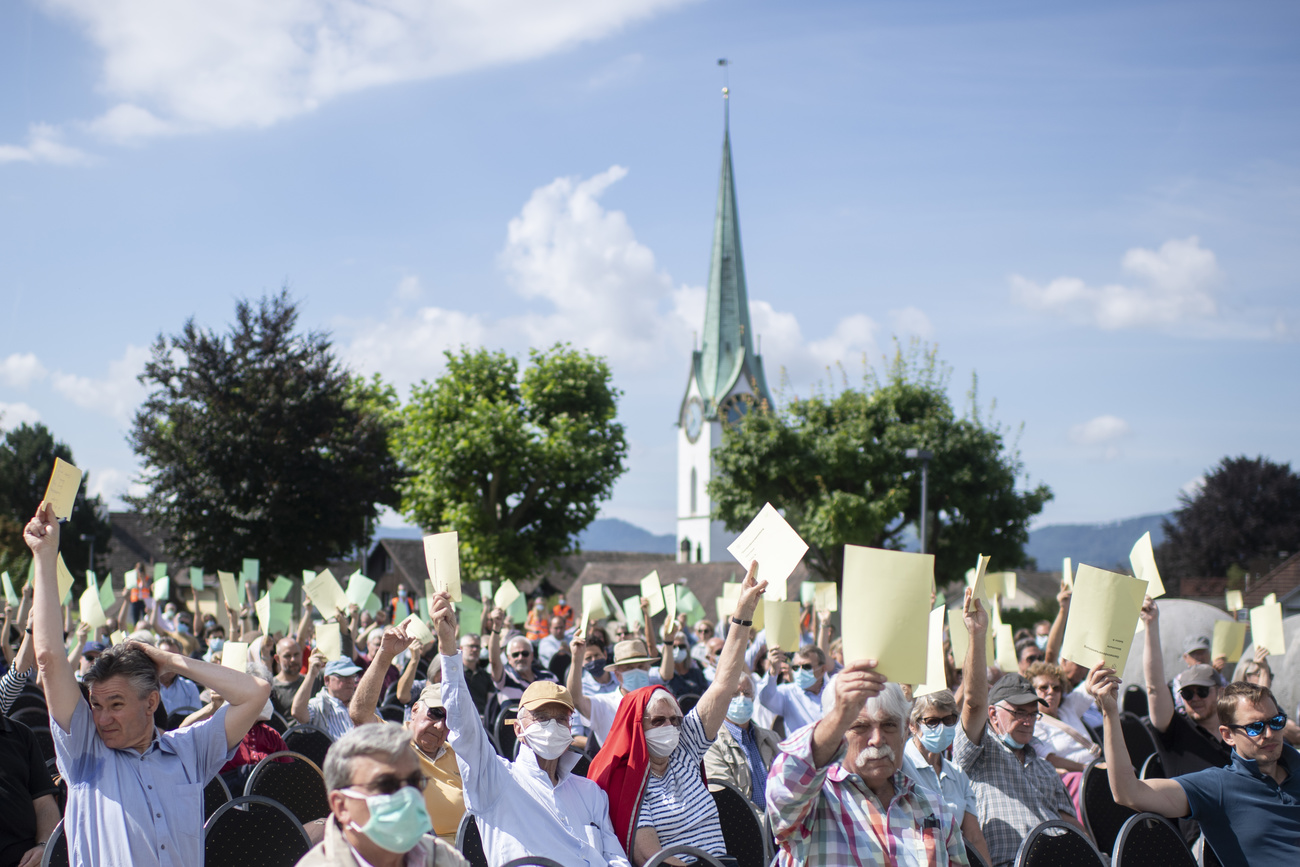Swiss voters approve paternity leave, bury family tax breaks

A two-week federally mandated paternity leave passed with strong support, while more generous tax deductions for families with children failed at the ballot box.
The paternity leave proposal won 60% of the vote, and 63% of voters came out against more family tax breaks.

More
Vote results: September 27, 2020
Paternity leave
The endorsement of the legal reform giving new fathers ten days of paid leave lifts Switzerland out of the position of laggard on paternity leave in Europe. Currently men are not entitled to any statutory days off after the birth of a child, although they can request one or two days’ leave under the code of obligations in Swiss labour law. Some employers in both the private and public sectors have more generous policies.
As results came in on Sunday, labour union and family organisations expressed relief that the measure had passed.
“This result shows that society has evolved and that a model where women have to stay at home is no longer appropriate for the times,” said Philippe Gnaegi, the director of Pro Familia, an umbrella organisation for family groups which had campaigned for four weeks of paternity leave. In a statement, Pro Familia said it is now setting its sights on family leave policies where mothers and fathers may split a longer parental leave between them, similar to models in other European countries.
Adrian Wüthrich, president of the labour union organisation Travail Suisse, said the paternity leave vote was a first and important step in the right direction for Switzerland’s family policies. He said he was pleased that fathers are finally given more time to care for a child than employees are given when they move house – both scenarios had generally been afforded two days’ leave under labour policies in place before Sunday’s vote.
Those against the initiative had cited the current economic recession as a result of the Covid-19 pandemic as a reason for rejecting it, arguing that the burden on small and medium-sized businesses (SMEs) would be too great. Susanne Brunner of the right-wing Swiss People’s Party, a Zurich-area local councillor who co-chaired the committee against paternity leave, told Swiss Public Television SRF after the results came in that “SMEs are the losers” of the vote.
Speaking for the Swiss government, Health Minister Alain Berset said the paternity leave outcome was “very good news for families” and that the day’s high voter turnout of nearly 60% reflected what a universal issue it was.
The paternity leave approved on Sunday will be paid under the state-run income compensation scheme – part of the social security system funded in equal parts by employers and employees. Fathers are entitled to 80% of their average earnings, up to a maximum of CHF196 ($213) per day, for leave which they must take within six months of the child’s birth. The total annual costs are estimated at CHF230 million.
To be eligible they must have worked for a minimum of five months in Switzerland and made contributions to the old-age pension scheme for at least nine months. Only biological fathers can claim these benefits.
The ten days are a compromise solution overwhelmingly approved by parliament in 2019 after Pro Familia, along with an alliance of women’s, men’s and family groups and trade unions, submitted a people’s initiative calling for 20 days (four weeks) of paid paternity leave. The alliance accepted the compromise and withdrew its initiative, although it said it would have reintroduced it if voters had rejected the two-week plan.
Previous attempts in parliament to introduce paternity leave, beginning in the 1990s, have all failed. A paid maternity leave of 14 weeks was introduced in 2005.
Though a large swathe of the political spectrum supported the current proposal, it had its detractors. Those who forced the nationwide vote on the amendment – a group comprised mainly of members of the right-wing Swiss People’s Party and small- and medium-sized businesses – argued that small business owners would have to take on the burden of financing a benefit for the few.
Supporters, on the other hand, say that paternity leave will move Switzerland towards greater gender equality and families towards achieving a better work-life balance. The last poll before Sunday’s vote showed 61% in favour, 35% against and 4% undecided.
The amendment will come into force in 2021.
Federal tax deductions
The failed proposal on family tax breaks had two components: to increase the tax-deductible sum for childcare expenses from CHF10,100 to CHF25,000, and to increase the general deduction for children from CHF6,500 to CHF10,000.
The original intent of the amendment was to alleviate the high costs of daycares or crèches for working families and encourage mothers to rejoin the workforce, part of the government’s effort to address skilled-worker shortages.
Parliament approved the reform last year but only after fierce debate, particularly with regard to the second element: the general deduction, which was introduced by the centrist Christian Democratic Party, and which a coalition of left-leaning parties decided to challenge through a nationwide vote.
The left-wing Social Democrats, Green Party and centre-left Liberal Greens believe the anticipated CHF380-million annual loss to government coffers is too high a price to pay for a tax rebate they say will go mainly to high-income families. Currently around 60% of families with children in Switzerland pay the federal direct income tax and would be eligible for a tax break under the general child deduction – albeit on a sliding scale, so families with smaller incomes would receive smaller rebates.

More
Will proposed tax deductions for families with kids benefit mainly the rich?
The business community was divided on the issue, while the trade unions recommended rejecting the reform.
As Sunday’s vote result became clear, those who had campaigned against the tax breaks called their win “a huge surprise” that showed that voters saw through the government’s “fraudulent labelling” of the policy, as Beat Jans of the “no” committee told Swiss Public Television SRF.
His group’s argument regarding the high cost of “a tax break for the rich” seems to have resonated with voters towards the end of the campaign: a survey carried out in early September showed a reversal of public opinion, with more people (52%) against the amendment than in the previous poll, published in August.
Finance Minister Ueli Maurer said he is “not surprised” by the result, because he acknowledged that the packaging of the tax break proposal did not reflect its contents. Maurer expects that parliament will take up the issue of family tax breaks again in 2021 with a renewed proposal.
Anti-immigration initiative: 38.3% Yes 61.7% No
Credit for fighter jets: 50.2% Yes 49.8% No
Paternity leave: 60.3% Yes 39.7% No
Tax break childcare: 36.8% Yes 63.2% No
Reform hunting law: 48.1% Yes 51.9% No
Turnout: 59.4%
It was only the second set of nationwide votes this year, rather than the third, as a ballot in May was cancelled due to the Covid-19 crisis.
Around 5.4 million Swiss citizens, including registered expatriate Swiss, were eligible to take part in the votes.
There were also numerous ballots at cantonal and local levels on September 27.

In compliance with the JTI standards
More: SWI swissinfo.ch certified by the Journalism Trust Initiative














Join the conversation!